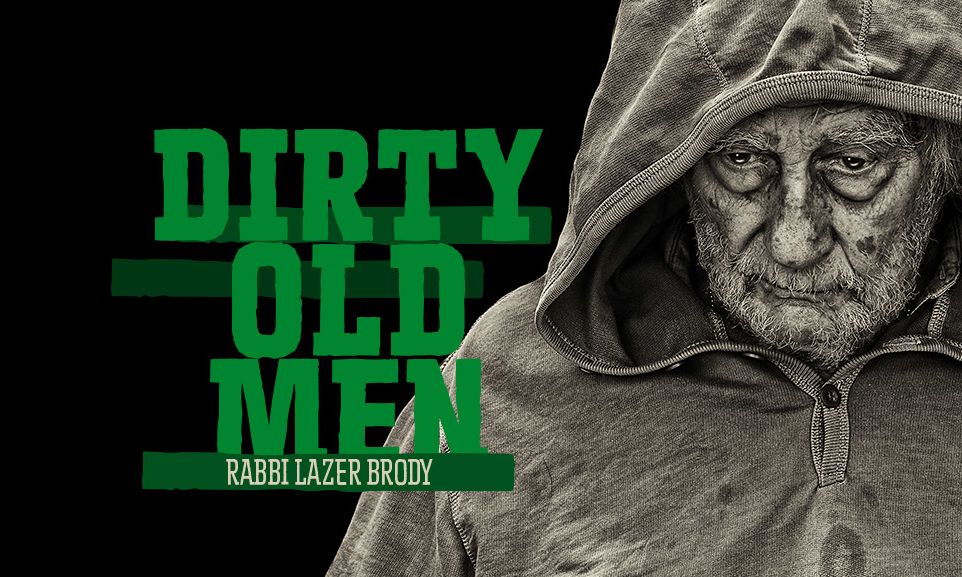
Dirty Old Men
When we understand the teachings of Rebbe Nachman, we understand how politics, the media, and entertainment are full of licentiousness and insanity…

Rebbe Nachman of Breslev tells the story of a Ukrainian Chassid who needed to travel to a town that was a half-day’s journey away. The only wagon-master he could find was a drunkard, so with no other alternative, the Chassid hired him.
Every Ukrainian town has a pub; every time they passed through a town, the semi-inebriated wagon-master would stop and have another drink. Finally, one town before their destination, they reached a torn-down edifice that years ago, was an inn and pub. Again, the wagon-master stopped the wagon and got off. He walked up ruins of brick and wood, peered through each window and doorway, and sighed deeply. After he circled the deserted, broken-down structure, he returned to the wagon and sighed so deeply that his entire body shuddered. He even had a tear in his eye.
The Chassid, puzzled, asked the wagon-master: “I understand why you stopped at every pub in every town. But why did you stop at this old demolished inn? And why did you look in every window and doorway? And why are you so sad?”
The wagon-master sighed another deep sigh and replied, “Achhh, this was the pub of all pubs. I remember the parties we used to have when all of us wagon-masters would get together! And the rooms…I remember who I partied with in each room. Achhh, those were the days – gone forever!”
What was Rebbe Nachman’s point in the above parable? The old wagon-master was lamenting the broken-down inn that no longer stood, while bitter-sweetly reminiscing about what he used to do there in his youth, but can no longer do in his old age. Rebbe Nachman’s parable elaborates on a classic expression of one of our great sages: “Rebbe Shimon ben Akashiya says, the older a vulgar individual  becomes, the more he loses his sanity. But, the older a servant of Hashem becomes, the more he attains self-composure.” (Mishna, Kinim 3:6).
becomes, the more he loses his sanity. But, the older a servant of Hashem becomes, the more he attains self-composure.” (Mishna, Kinim 3:6).
The period of “Shovevim” is the 6-week period named as an acronym for the six Torah portions from the weeks of Shmot, Va’eira, Bo, Beshalach, Yitro and Mishpatim. The Shovevim period is a most conducive time for enhancing personal holiness. Personal holiness is the prerequisite for genuine service of Hashem and Torah scholarship. Torah and mitzvot learned and performed when devoid of personal holiness not only lack productiveness but lead to negative traits such as arrogance.
The time to strive for personal holiness is when we’re young. That way, as we get older and our physical urges become weaker, we attain enhanced self-composure and channel the energy that we once needed to resist lust into deeper connecting with Hashem. But, when a person does not strive for personal holiness, and he is subservient to his bodily appetites, the more he loses his youthful looks, energy and strength, the more insane he becomes.
Even in my old pre-teshuvah days as a student in university, we used to laugh at the “dirty old men”, the licentious old buzzards with the pot bellies who would attempt, do, or say lewd, improper,and unacceptable things. Afraid of every new day when they lose more and more of their lustful prowess, they grab what they can in total insanity, even if it means sacrificing career, family, fame, million-dollar salaries, and reputation.
When we understand the teachings of Rebbe Shimon ben Akashiya and Rebbe Nachman of Breslev, we can understand how politics, the media and show business are full of these dirty old men – they’ve never worked on personal holiness.
If you don’t want your golden years to become a nightmare of insanity, make personal holiness a top priority. That way, you can look forward to a future of joy and tranquility, may we all so merit, amen!







Tell us what you think!
Thank you for your comment!
It will be published after approval by the Editor.